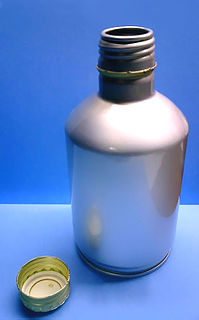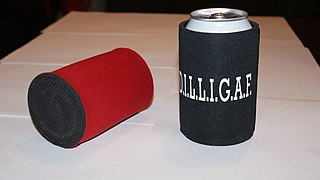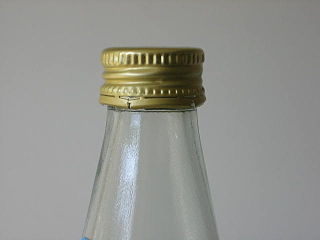
A drink can is a metal container designed to hold a fixed portion of liquid such as carbonated soft drinks, alcoholic drinks, fruit juices, teas, herbal teas, energy drinks, etc. Drink cans are made of aluminum or tin-plated steel. Worldwide production for all drink cans is approximately 370 billion cans per year.

A bottle cap or bottle top is a closure for the top opening of a bottle. A cap is sometimes colourfully decorated with the logo of the brand of contents. Plastic caps are used for plastic bottles, while metal with plastic backing is used for glass; plastic caps are commonly made from PE or PP, whilst metal caps are usually either steel or aluminum. Plastic caps may have a pour spout. Flip-Top caps like Flapper closures provide controlled dispensing of dry products. Caps for plastic bottles are often made of a different type of plastic from the bottle.

The Oregon Bottle Bill is a container-deposit legislation enacted in the U.S. state of Oregon in 1971 that went into effect in October 1972. It was the first such legislation in the United States. It was amended in 2007 and 2011. It requires applicable beverages in applicable sizes in glass, plastic or metal cans or bottles sold in Oregon to be returnable with a minimum refund value. The refund value was initially 5 cents until April 1, 2017, when it increased to 10 cents. The Oregon Legislature has given the Oregon Liquor Control Commission the authority to administer and enforce the Bottle Bill. For COVID-19 related reasons, from March 15, 2020 until July 5, 2021 enforcement was suspended a few times and retailers were allowed to limit acceptance hours. Oregon Beverage Recycling Cooperative (OBRC), a private cooperative owned by retailers and beverage distributors administers the collection and transportation of returned containers and keeps all the unclaimed deposits. Materials from returned containers are sold by the OBRC and proceeds are handed out to beverage distributors.

Snapple is a brand of tea and juice drinks which is owned by Keurig Dr Pepper and based in Plano, Texas, United States. The company, which was originally known as Unadulterated Food Products, was founded in 1972. The brand achieved some fame due to various pop-culture references including television shows.

Mr. Clean is a brand name and mascot, owned by the American company Procter & Gamble, used for an all-purpose cleaner and later also for a melamine foam abrasive sponge.

Fresca is a grapefruit-flavored citrus soft drink created by The Coca-Cola Company. Borrowing the word Fresca from Spanish, Italian and Portuguese, it was first introduced in the United States in 1966. Originally a bottled sugar-free diet soda, sugar sweetened versions were introduced in some markets.

Closures are devices and techniques used to close or seal container such as a bottle, jug, jar, tube, can, etc. Closures can be a cap, cover, lid, plug, etc.

Watkins Incorporated is a manufacturer of health remedies, baking products, and other household items. It is based in Winona, Minnesota, United States, which utilizes an omni-channel marketing strategy which includes a national retail sales force which focuses on selling to the retail channel as well as an independent sales force of 25,000 people to distribute its products.

MOM Brands Company was an American producer of breakfast cereals, headquartered in Northfield, Minnesota. It marketed its products in at least 70% of the country's grocery stores, with estimated sales in 2012 of US$750 million. It operated four manufacturing plants, in Northfield, Minnesota; Tremonton, Utah; Asheboro, North Carolina; and St. Ansgar, Iowa. The company had distribution centers in Grove City, Ohio; Coppell, Texas; and Salt Lake City, Utah.

Induction sealing is the process of bonding thermoplastic materials by induction heating. This involves controlled heating an electrically conducting object by electromagnetic induction, through heat generated in the object by eddy currents.

Telebrands is an American direct response marketing company, and the original creator of the "As Seen On TV" logo and category of trade.

MonaVie is a defunct, American multi-level marketing company that manufactured and distributed products made from blended fruit juice concentrates, powders, and purées. The company was the subject of several controversies. Health claims for its products had not been scientifically confirmed or approved by regulatory authorities, and its chairman had been previously involved in false health claims concerning another beverage company. According to Forbes, MonaVie's business plan resembled a pyramid scheme. In 2015, the company defaulted on a US$182 million loan and went into foreclosure. Florida-based Jeunesse Global took over MonaVie’s assets when it purchased the note for $15 million.

A koozie (US) or stubby holder (Australian) is a fabric or foam sleeve that is designed to thermally insulate a beverage container, like a can or bottle.
Jake Bronstein, is an entrepreneur, Internet personality, and blogger. He was an editor of the US edition of FHM, a men's magazine. Bronstein markets himself as a "fun evangelist," and provides consulting services to that end through his marketing agency GiantMINIATURE.

Upper Table Rock and Lower Table Rock are two prominent volcanic plateaus located just north of the Rogue River in Jackson County, Oregon, U.S. Created by an andesitic lava flow approximately seven million years ago and shaped by erosion, they now stand about 800 feet (240 m) above the surrounding Rogue Valley. The Table Rocks are jointly owned; The Nature Conservancy is responsible for 3,591 acres (1,453 ha), while the Bureau of Land Management is responsible for 1,280 acres (520 ha).

A tamper-evident band or security ring serves as a tamper resistant or tamper evident function to a screw cap, lid, or closure. The term tamper-proof is sometimes used but is considered a misnomer given that pilfering is still technically possible.
Ecologic Brands, Inc. is an Oakland, California-based company that designs and manufactures bottles from recycled cardboard and newspaper.
Prizes are promotional items—small toys, games, trading cards, collectables, and other small items of nominal value—found in packages of brand-name retail products that are included in the price of the product with the intent to boost sales, similar to toys in kid's meals. Collectable prizes produced in series are used extensively—as a loyalty marketing program—in food, drink, and other retail products to increase sales through repeat purchases from collectors. Prizes have been distributed through bread, candy, cereal, cheese, chips, crackers, laundry detergent, margarine, popcorn, and soft drinks. The types of prizes have included comics, fortunes, jokes, key rings, magic tricks, models, pin-back buttons, plastic mini-spoons, puzzles, riddles, stickers, temporary tattoos, tazos, trade cards, trading cards, and small toys. Prizes are sometimes referred to as "in-pack" premiums, although historically the word "premium" has been used to denote an item that is not packaged with the product and requires a proof of purchase and/or a small additional payment to cover shipping and/or handling charges.
In marketing, premiums are promotional items — toys, collectables, souvenirs and household products — that are linked to a product, and often require proofs of purchase such as box tops or tokens to acquire. The consumer generally has to pay at least the shipping and handling costs to receive the premium. Premiums are sometimes referred to as prizes, although historically the word "prize" has been used to denote an item that is packaged with the product and requires no additional payment over the cost of the product.
















